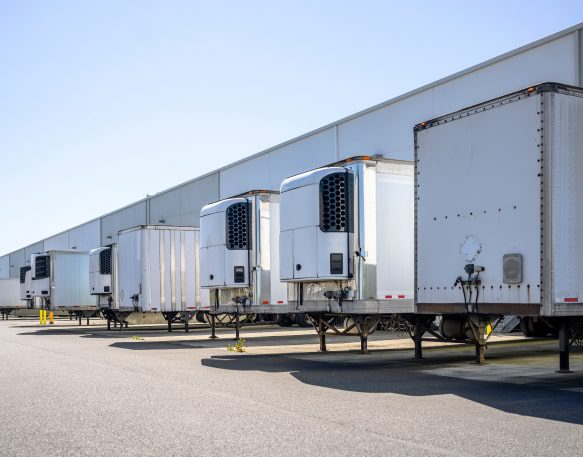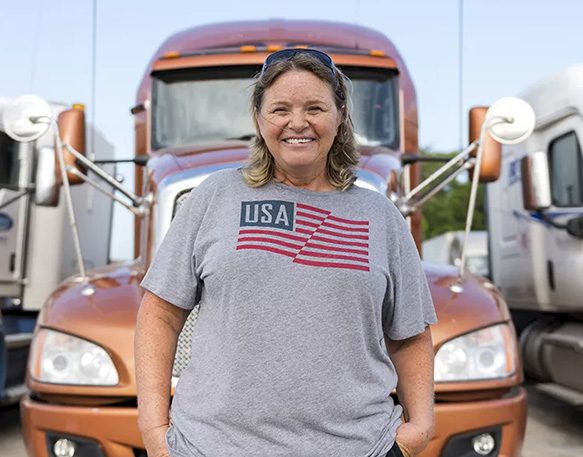As a carrier, you’ll need to choose which vehicle to use before you can get on the road. But with so many options to choose from — including everything from flatbeds to dump trucks to car haulers — that can be a challenge. Two of the most common trailers you may want to consider are the dry van and the reefer.
Both reefers and dry vans are reliable trailers and each has its own pros and cons. To ensure you can safely and securely transport loads with your vehicle of choice, be it a van or reefer, you’ll need to consider each trailer type’s features, advantages, and disadvantages, as well as the type of cargo you’ll haul. In this article, we’ll go over the basics of reefers and dry vans, the benefits, drawbacks, and differences between a dry van vs reefer, reefer vs dry van rates, answer the question, ‘Can you use a reefer as a dry van?’ and go over everything else you need to know to decide whether a reefer vs dry van is best for your business.
What is a dry van?
Versatile and large, dry vans are the most common type of trailer in the trucking industry. Carriers generally use these unrefrigerated trailers to haul dry, non-perishable freight products that don’t require temperature control, such as kitchen appliances, non-perishable food, furniture, electronics, and clothing.
However, that’s just the tip of the iceberg when it comes to dry van capabilities. Dry van trailers can haul anything that’s dry, non-perishable, and fits in the truck. This cargo is generally transported in pallets or boxes and can travel either short or long distances in a dry van.
While all dry vans are unrefrigerated and have legs to stand on when unhooked from the cab, there is some variation between them. Dry vans are generally 13.5 feet high and 8.5 feet wide, but they can be anywhere between 48 and 53 feet long. Some dry van trailers come equipped with loading ramps or roll-up doors, while others feature aerodynamic skirts.
Given how versatile dry vans are, finding loads to fit them is relatively simple. After all, dry vans are large and suitable for carrying boxed, palletized, and loose freight and equipment. They can handle both full and less-than-truckload (LTL) shipments and are ideal for transporting everything from clothing to packaged foods to machinery. Essentially, anything that doesn’t require a particularly cold or warm environment and doesn’t exceed the size and weight restrictions can be transported via a dry van, so finding loads shouldn’t be a problem as long as you have a quality load board to help you.
What are the advantages of using a dry van?
Dry vans have plenty to offer carriers in their own right without comparing a dry van vs reefer. Not only are they suitable for local and long-distance hauls, but they can also carry an extensive range of cargo. Whether you need to haul designer clothes, building materials, cleaning products, electronics, pots, pans, or other non-perishable items, a dry van can do the job.
Moreover, dry vans are incredibly convenient and can save you time. With a dry van, you can easily use the drop and hook load method, so you won’t have to wait for your trailer to be unloaded. Instead, you can drop a trailer off, immediately pick up a new one, and get back on the road quickly. This can help you maximize your profits by saving your time.
Dry vans also provide a high level of security. After all, dry van trailers are fully enclosed and easy to lock, so it will be difficult for anyone to steal your cargo. Plus, since dry vans are fully enclosed, the cargo is well protected from theft, damage, rain, snow, hail, and other outside elements, making them a great option no matter where you’re driving.
What are the disadvantages of using a dry van?
As with anything, dry vans do have some disadvantages that are worth addressing for anything considering a dry van vs reefer. The wood floor is the main disadvantage of using dry vans to haul freight. Since wood is easily damaged by condensation and moisture, you may need to take your truck in for repairs more frequently compared to other vehicle types. Sometimes your cargo itself can contribute to the moisture and condensation build-up, but it can also occur as a result of loading or unloading during bad weather.
What is a reefer?
Carriers use reefer trailers, also known as refrigerated trailers, to haul perishable goods and other items that require temperature control during transportation. That’s the biggest difference between a reefer vs dry van. Reefers are ideal for everything from frozen foods to pharmaceuticals to chemicals.
These trailers are equipped with an HVAC system that controls the temperature. Other elements essential to reefers include the evaporator, condenser, compressor, and reefer engine. Since wood absorbs moisture and expands and contracts with temperature changes more than metal, reefer floors are generally made of metal.
Reefers are around 13.5 feet high, 8.5 feet wide, and between 48 and 55 feet long, much like dry vans. However, reefers have a smaller interior cargo space due to all the insulation required to keep the cargo at the right temperature.
What are the advantages of using a reefer?
Not only do reefer trailers provide excellent protection from theft and inclement weather, but they are also in high demand, which means finding reefer loads will be easy with a quality load board. The fact is, people are never going to stop eating food or require medicine that needs to be stored in a temperature-controlled environment, so reefer demand will always be high. This high need to transport perishable goods means that hauling reefer loads can be an incredibly lucrative business decision. When comparing reefer vs dry van rates, you can typically charge more for your services if you have a reefer.
What’s more, reefers are incredibly versatile vehicles. While you will have the option to carry refrigerated freight (a big difference between a reefer vs dry van), you won’t be limited to carrying only those loads. You can also haul dry loads or other temperature-sensitive products with your reefer, which gives you more flexibility regarding which loads you pick up and which routes you can take. Back-hauling and tri-hauling will become much easier, as you’ll be able to transport a much larger variety of products. That means fewer deadhead miles and more profit.
What are the disadvantages of using a reefer?
Reefers are an excellent option for many carriers, but there are also a few disadvantages to be aware of when comparing a reefer vs dry van.
First, reefer trailers are complex, which means more responsibility. Not only will you need to carefully monitor and maintain your reefer’s cooling equipment to prevent malfunction, but you’ll also need to thoroughly clean your trailer regularly. This is especially true if you’re hauling food, as the Food Safety Modernization Act (FSMA) has strict cleanliness guidelines for trailers that carry food. You’ll also need to carefully monitor your trailer’s temperature to ensure that you don’t damage any loads.
Since reefer trailers need to be pre-cooled before the cargo is loaded, they also require more preparation time than other trailers. Reefer trailers can’t haul heavy or oversized loads, and they can be loud due to the sound of the running motor regulating the temperature. Additionally, loading and unloading at docks can last longer because most reefers aren’t suitable for drop and hook trucking. This means you can’t drop off your load and then immediately hook up to a new empty or preloaded container.
Additionally, reefers are expensive. Not only is the trailer itself more costly than other options on the market, but the motor and equipment used to control the internal temperature also increase fuel consumption. Those increased costs are important to consider when comparing reefer vs dry van rates.
Can you use a reefer as a dry van?
The simple answer is yes! Whether you use a dry van or reefer, you can carry dry van goods. Many carriers and shippers never consider using reefer trailers as dry vans, but it’s possible to haul dry van freight with reefers. However, when hauling dry freight with a reefer vs dry van, there are a few things you’ll need to keep in mind.
Since reefer units typically weigh several hundred pounds, your load capacity will decrease by between 500 and 1,000 pounds. This reduces carrying capacity to an average of 42,500 pounds. While this is only a 1-2% reduction in load capacity, it can mean being forced to pass on certain loads because you don’t have a high enough load capacity.
Additionally, your load size capacity will be lower when using a reefer trailer vs dry van, as the insulation and fiberglass panels that keep the trailer temperature controlled remove an average of three inches of space on the sides and top of the trailer. In some cases, a different loading configuration may help, but that may not always be possible.
You also won’t necessarily want to haul the same goods as you might with a dry van. For example, while products like toilet paper rolls can be floor loaded in a dry van, doing the same in a reefer can damage the freight, as the metal ridges on the trailer floor will press into the rolls. However, if the rolls are on a pallet, you wouldn’t need to worry about indentations.
You may also need to employ different stabilization methods when hauling dry cargo with a reefer vs dry van. While it’s best to use load bars with refrigerated goods on reefers for circulation reasons, you’ll need to follow dry van transportation standards when hauling dry goods in reefers. Airbags are best with dry van freight.
Since reefers were designed for loads that require a temperature-controlled environment and reefer loads generally pay more than dry ones, it’s best to only use reefers to haul dry freight when absolutely necessary. For example, hauling dry freight might make sense if you need to back-haul after delivering a refrigerated load and there aren’t any available reefer loads.
So, which is best: reefer vs dry van?
It depends! Each vehicle has advantages and disadvantages and a lot comes down to what you want to carry. Reefers and dry vans are both easy to secure and can keep rain and snow from damaging their cargo. These trailer types are also roughly the same size. However, they do differ from one another in a few key ways that can impact your decision.
For one, reefers are insulated and temperature controlled, whereas dry vans are not. This can actually slow down a carrier given that reefers will need to be pre-cooled before products are loaded. Otherwise, the temperature won’t suit the products, leading to damage or spoiling.
Secondly, when it comes to versatility in a reefer vs dry van, reefers come out ahead. You can transport dry or temperature-sensitive goods with a reefer trailer, but the same can’t be said for a dry van. If you have a dry van, you can only haul loads that don’t need to be temperature controlled.
It’s also worth noting that reefers cost more upfront than dry vans do because they require more components. After all, every reefer needs condensers, evaporators, compressors, and complex engine parts to maintain the trailer’s internal temperature throughout the journey. Plus, reefers require insulation and metal duct flooring rather than the more affordable wooden floor used in dry vans.
Despite the higher upfront cost of reefer trucks, they can still be very profitable. After all, there are fewer reefer trucks on the road than dry vans. There are over 1.7 million dry vans and just 400,000 reefers, meaning demand for reefer trucks can be quite high given the importance of the goods they deliver. Not only will you potentially be able to charge shippers higher rates as a result, but you’ll also likely be able to find reefer loads more easily because there’s less competition.
Final thoughts on choosing a reefer trailer vs dry van
If you’re starting a new trucking business, one of the first and most important things you need to do is decide between a van or reefer. When comparing a reefer vs dry van, the main difference is that reefers are temperature controlled, which gives them more versatility. However, if you know you won’t need to haul temperature-sensitive freight, opting for a dry van vs reefer can help you cut down on upfront costs. On the other hand, since reefer rates come out on top when comparing reefer vs dry van rates, purchasing a reefer trailer vs dry van can be a great long-term investment despite the higher upfront costs.
After you’ve decided on a reefer vs dry van and are ready to hit the road, it’s time to find tools to support your business. With DAT’s carrier fleet services, not only will you have access to 722,500 daily loads (266,000 of which are exclusive to DAT), but you’ll also be able to quickly filter results to find the perfect loads for your business’ needs. On top of that, you can view freight brokers’ ratings and credit scores, use the DAT Directory, optimize your route with mapping services, take advantage of the DAT One mobile app, and more — all without hidden fees and extra charges.
Start finding freight with DAT today!
The DAT load board can help you find the perfect loads, regardless of whether you drive a reefer or a dry van. With DAT, you’ll save time, money, and energy when it comes to finding loads.
Sign up for the DAT load board today to access thousands of quality loads!




